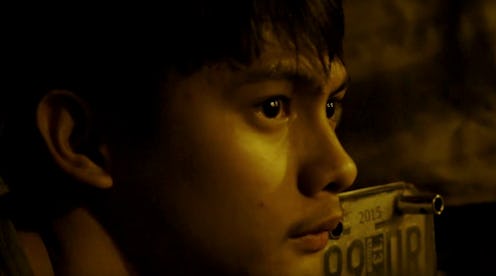Entertainment
The True Story Behind Netflix's New Drug Drama Is Causing Controversy
Netflix's first Filipino original series, Amo, is produced and directed by acclaimed Filipino filmmaker Brillante Mendoza in conjunction with the network TV5 and premiered on Monday, April 9. This controversial drama is centered around the brutal war on drugs in the Philippines. The main character, high school student Joseph (Vince Rillon), starts out as a smalltime drug dealer but soon finds himself sinking deeper into the dark and violent world of crime in Manila. The situation in which Joseph finds himself isn't so different from that of countless individuals embroiled in the current drug climate in the Philippines, but is Netflix's Amo based on a true story? That certainly seems to have been the series' goal.
"This is something based on research, and the police had their input too," Mendoza tells AFP about Amo. "Our story was based on real events."
According to the BBC, Amo takes place amid the chaos of the ongoing drug wars begun by Filipino President Rodrigo Duterte (pictured below). Human Rights Watch (HRW) reports that Duterte initiated his anti-drug policy on June 30, 2016. It has since resulted in the deaths of approximately 12,000 individuals — although many human rights groups claim the real number is even higher. Most of the people killed have been low level dealers and users. Of those 12,000, about 4,000 of those deaths reportedly happened as a result of action from police officers, while the remainder were carried out by what HRW claims were "unidentified gunmen."
Some people disagree with Amo's take on the story, though. Over 2,000 people have signed a petition in an attempt to get the series banned, claiming that it glorifies Duterte's policies and the war on drugs. Mendoza himself is an open supporter of Duterte — he even directed Duterte's State of the Nation Address in both 2016 and 2017 — but he denies claims that Amo is fodder for Duterte's political agenda. "As a filmmaker stepping into this project, I want to tell truthful stories," Mendoza told BBC in Manila, "I don't care about politics."
“I have this feeling that because I am doing a series against illegal drugs that people are prejudging it,” Mendoza went on to tell the Telegraph. In Amo, he claims he's trying to tell both sides of the story. “It will pass through different points of view, different perspectives," he tells the Telegraph, "depending on the subject matter that we are dealing with." Mendoza goes on to say that Amo will focus at first on the story of Joseph, the teenage meth dealer that is the primary protagonist of the story. As the story develops, Mendoza adds in the perspective of Joseph's uncle, a corrupt police officer in Manila, portrayed by Derek Ramsay (pictured below).
While Mendoza claims he tries to paint a fair and two-sided portrayal of the drug wars, several parties have already come forward to criticize Amo for allegedly sugar-coating the ugly reality of the situation in the Philippines. Phelim Kine, the deputy director of the Asia division of HRW openly called out Amo in an interview with the BBC. "One of the most notably preposterous elements of the show," Kine claims, "is the significant number of suspected drug users and dealers actually surviving their encounters with the Philippine National Police, which is contrary to what has actually been occurring since the drug war began in 2016."
Amo will mark Mendoza's second foray into portraying Duterte's war on drugs. His first came with his 2016 film, Ma' Rosa, which was nominated for the prestigious Palme d'Or at the Cannes Film Festival that year. Ma' Rosa follows the story of a wife and her husband, who operate a convenient store in Manila. Their meager income isn't enough to sustain their family of four, so they turn to selling crystal meth out of the shop and are eventually caught and jailed. The children are then left with the Herculean task of freeing their parents from the clutches of the corrupt city officials. Variety called Mendoza the "best-known film director" of the Philippines, with his work having earned prestigious nominations note only at Cannes, but at Berlinale, Venice Film Festival, and more.
After wrapping Ma' Rosa, Mendoza continued his research on the drug war with the aim of making Amo. He explained to AFP that Amo was initially meant to air exclusively on TV5, a local Filipino TV station, but he convinced the head of the station to send two episodes to Netflix. "I think one of the reasons why they [Netflix] were interested in the material, in the story, is the way it was shot," he speculates. "It looks very realistic, like a documentary-style shoot and unlike your typical TV series."
That may very well be the case — Mendoza is known in particular for his gritty realism, showing the lives of ordinary people that slip into the seedy underbelly of society. Amo, which means "master," is meant to be one of these illuminating tales. Whether or not American audiences will respond remains to be seen.
